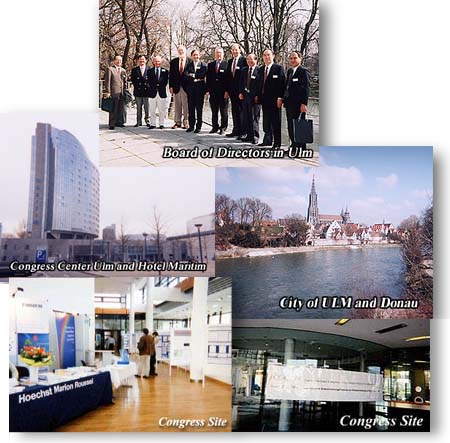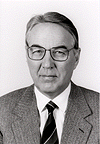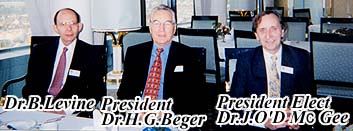Previous Newsletters
Newsletter No. 3
The International Society of Gastroenterological Carcinogenesis
Number 3, 1999
The Latest issue was available now, including the report from the Second International Conference of the ISGC, held in Ulm, Germany, in March of 1999.
Ulm Conference A Great Success
The 2nd International Congress on Gastroenterological Carcinogenesis was held in Germany at the Congress Center of the city of Ulm from March 25 to 27, 1999.
The meeting was organized by the International Society of Gastroenterological Carcinogenesis and the University of Ulm. After the Founding Meeting in 1996 this second meeting focused on the molecular mechanisms and evolution of GI-tract malignancies and aimed at the prevention, early detection and treatment of cancer. 284 basic researchers and clinicians from 17 countries, among them China, Korea and Russia, participated in the meeting.
The Scientific Program extended over two and a half days and comprised 11 main sessions, one workshop about "Molecular factors of prognosis in GI-tract cancer", one symposium about "Prevention of cancer" and one satellite symposium about "Selenium and carcinogenesis".

Ninety-two oral presentations, including main lectures, and 41 posters were selected for presentation to the audience of the 2nd International Congress of Gastroenterological carcinogenesis.
The mutual discussions between basic researchers and competent clinicians from all over the world are the promising feature in the field of gastroenterological carcinogenesis and the major advantage of the society and the 2nd meeting as well. The participants of this multidisciplinary conference were basic scientists, molecular biologists, pathologists, gastroenterologists, gastrointestinal surgeons, biochemists and clinicians. The 3-day program included 133 scientific presentations and 5 keynote lectures from worldwide accepted researchers.
The newest insight in Molecular pathogenesis of GI-cancer was presented by Curtis C. Harris, Director of the Laboratory of Human Carcinogenesis, National Cancer Institute, Bethesda. Harald zur Hausen, Director of the German Cancer Research Center at Heidelberg, talked about Viral induction of human cancer. A second lecture by Curtis C. Harris dealt with Cancer prone oxyradical overload disease, and one lecture was dedicated to High grade dysplasia in GI-cancer - Consequences for clinical decision making? given by Paul Hermanek, Professor of Pathology, University of Erlangen, Germany. A most promising keynote lecture was held by Axel Ullrich, Director of the Max Planck-Institute for Biochemistry in Munich about Receptor tyrosine kinases as targets for cancer therapy.
The meeting was generously supported by nationwide and European cancer institutions; scientific support came from the German Cancer Society, the German Society of Surgery, the German Society of Gastroenterology and Metabolism, the Deutsches Krebsforschungszentrum Heidelberg, the International Union Against Cancer, the European Association for Cancer Research, and the University of Ulm Cancer Center.
The Award Committee of the International Society of Gastroenterological Carcinogenesis dedicated the Charles Heidelberger Award to Curtis C. Harris, Director of the Laboratory of Human Carcinogenesis, National Cancer Institute, Bethesda for his major and life span contribution to the understanding of carcinogenesis. Additionally, there was one award for the best scientific oral presentation and two awards for the best scientific poster presentation.
The scientific presentations including lectures, free paper massages and poster presentations focused on the following six main topics:
 |
|
by Hans G. Beger President of the ISGC
Department of General Surgery, University of Ulm, Germany
Report of General Assembly of ISGC in Ulm
The General Assembly of ISGC took place on Friday, March 26, 1999 during the 2nd International Congress on Gastroenterological Carcinogenesis, held in Ulm/Germany from March 25 to 27, 1999.
Participants:
Hans G. Beger/Ulm, President
J. O'D. McGee/UK, President Elect
T. Oohara/Japan, Past President
E. Tahara/Japan, Secretary General
W. Yasui/Japan, Treasurer
C. C. Harris/USA, Board Member
H. Hofler/Germany, Board Member
B. Levin/USA, Board Member
N. Tanida/Japan, Board Member
P. Hainaut/France, International Faculty
R. Montesano/France, International Faculty
H. Kalthoff/Germany, International Faculty
V. Rotter /Israel, International Faculty
H. Ito/Japan, Member
Minutes of the General Assembly:
1. Call to order, President Beger/Germany
2. Report of the Meeting, President Beger/Germany
3. Report of the Secretary General E. Tahara/Japan
4. Report of the Treasurer W. Yasui/Japan
5. Report of the President Elect about the 3rd International Conference on Gastroenterological Carcinogenesis
6. How to increase membership of the ISGC
7. Awards of the society
8. Any other issue
1. Call to order. Present: 12 members, 3 guests.
2. Report of the President:
The date of the meeting was changed from October 1998 to
March 1999 because of overlapping international meetings with similar
topics in October 1998. A coincidence with other major international
meetings with related topics can be minimized but not completely
avoided. The 3-day meeting was held from March 25 to 27, 1999 in Ulm,
Germany. 284 registered participants from 17 countries: Austria,
China, Denmark, France, Germany, Hungary, Israel, Italy, Japan,
Korea, Poland, Russia, Switzerland, The Netherlands, Turkey, United
Kingdom, USA. 133 accepted oral and poster presentations selected by
the Scientific Committee from 179 submissions. 92 oral presentations,
41 poster presentations, 5 keynote lectures.
The 2nd International Congress on Gastroenterological Carcinogenesis had scientific support from the following institutions and societies: Deutsches Krebsforschungszentrum (DKFZ) Heidelberg, German Cancer Society, International Union against Cancer (UICC), European Association for Cancer Research, German Society of Surgery, German Society of Gastroenterology and Metabolism, and University of Ulm Cancer Center. The congress organization was provided by the following staff members: K. H. Link, F. Gansauge and M. Kornmann, Department of General and Visceral Surgery, University of Ulm and Mrs. Miriam Schatz as the congress secretary, Department of General and Visceral Surgery, University of Ulm.
The 3-day program consists of 11 major sessions: esophageal carcinogenesis; liver carcinogenesis; pancreatic carcinogenesis; colorectal carcinogenesis; gastric carcinogenesis; viral infection and tumor immunology; genetic changes during carcinogenesis; molecular biological approaches for early diagnosis and treatment; extracellular matrix and microenvironment; clinical and pathological studies in GI-carcinogenesis. Besides the main sessions there was one workshop about Molecular prognostic factors in GI-tract cancer, one satellite symposium about Selenium and carcinogenesis and one symposium about Prevention of cancer including nutrition, alcohol, tabacco and GI-cancer, occupational exposition, and chemoprevention of GI-cancer. The poster presentation was divided into three different poster sessions. Each poster was presented in a 6-minute statement and 6 minutes of discussion. The cost of the meeting is balanced by donations from industrial companies, the government, the German Research Society, and third-party payers.
3. Report of the Secretary General:
Summary of the Board of Directors meeting in Hiroshima 1996 was stated.
1) Establishment of ISGC
2) Discussion on own journal
3) Future meetings: The 2nd Conference : Ulm, Germany, 1998, by Prof. Beger
The 3rd Conference : Oxford, UK, 2000, by Prof. McGee
The number of society members is small (about 100, 60% are Japanese). We have to make an effort to recruit more members. However, the merit of being society member is unclear at present (only discount registration fee for the conference and no journal).
We have difficulty in having our own journal because of the limited number of society members. Sharing with the established journals, such as Int. J. Cancer, Gut and JNCI, should be considered. Dr. Montesano, Dr. McGee and Dr. Levin will negotiate with the respective journals.
To recruit new society members, we will open our own home page and distribute information about the presence of the society and contents of the conference widely, as suggested by Dr. Harris.
Report as Chairman of the Nominating Committee:
New ISGC officers (1999-2001) were approved as follows:
President:
Jim O'D. McGee (University of Oxford, Oxford, UK)
President Elect:
Bernard Levin (U.T. MD, Anderson Cancer Center, Houston, USA)

New Officers
New members of the Board of Directors (1999-2001) were approved as follows:
Richard Boland (University of California San Diego, La Jolla, USA)
Brian J. Carr (University of Pittsburgh, Pittsburgh, USA)
Helmut E. Gabbert (Heinrich-Heine-University, Dusseldorf, Germany)
Kohzoh Imai (Sapporo Medical University, Sapporo, Japan)
Michael P. Manns (Hannover Medical University, Hannover, Germany)
Ruggero Montesano (International Agency of Research on Cancer, Lyon, France)
Takeshi Oohara (Yokosuka Kyosai Hospital, Kanagawa, Japan)
Harald zur Hausen (German Cancer Center, Heidelberg, Germany)
Future meetings:
The 3rd Conference: Oxford, UK, 2001, by Prof. McGee
The 4th Conference: USA, 2003, by Prof. Levin
4. Report of the Treasurer:
Total income during 1996-1998 was 1,537,542 Japanese
Yen(¥)(1 US Dollar=about¥120), that included membership dues of 87
persons and donation from the 1st Conference (Hiroshima 1996). Total
expenditures(1996-1998)including costs of general operation and two
Newsletters was¥1,445,270.
Proposed budget (1999-2000) with income of ¥1,967,544 and expenditure of ¥1,640,000 was approved. The income includes membership dues from 350 persons and donation from the 10th Conference of the Japanese Society of Gastroenterological Carcinogenesis (Kumamoto 1999). The expenditure includes financial support of ¥200,000 for the 3rd Conference of ISGC in Oxford and costs of general operation and printing of two Newsletters, but does not includes preparation cost to establish a journal.
In summary, the society needs more members (up to 350) and donations to operate activity.
5. The report of the President Elect about the 3rd International Conference on Gastroenterological Carcinogenesis was not received in time for this Newsletter
6. To increase the membership of the society it was discussed that all participants of the 2nd International Meeting of the ISGC, who are non-members, should have a letter of invitation to become a member of the ISGC. President Beger agreed to follow this suggestion.
7. For the first time the International Society of Gastroenterological Carcinogenesis, on the occasion of the 2nd International Meeting held in the International Congress Center Ulm, offered four awards. The ISGC award dedicated to this meeting was the Charles Heidelberger Award for the life achievement of an international researcher. The society granted USD 5,000 for this major award. A second award for the best oral presentation of a free paper and two poster awards were dedicated. The ISGC free paper award amounted to USD 3,000 and the poster awards to USD 1,500 each.
Now ISGC Home Page opened
URL : http://www.convention.co.jp/isgc/index.html
The 3rd Conference of the ISGC 2001
President, Jim O'D. McGee (University of Oxford, Oxford, UK) will organize the 3rd International Conference of the ISGC in
Oxford, England 2001. The conference site and date have not been
finalized except that the date may be on August, 2001.
The 4th Conference of the ISGC 2003
The 4th International Conference of the ISGC will be held
in the United States in 2003. Bernard Levin (U.T. MD Anderson Cancer
Center, Houston, USA), President Elect of the ISGC will organize the
conference.
ISGC OFFICERS
President
Jim O'D. McGee (University of Oxford, Oxford, UK)
President Elect
Bernard Levin (U.T. MD Anderson Cancer Center, Houston, USA)
Past President
Hans G. Beger (University of Ulm, Ulm, Germany)
Secretary General
Eiichi Tahara (Hiroshima University, Hiroshima, Japan)
Treasurer
Wataru Yasui (Hiroshima University, Hiroshima, Japan)
BOARD OF DIRECTORS
| Shozo Baba | (Hamamatsu University School of Medicine, Hamamatsu, Japan) | 1996- |
| Richard Boland | (University of California San Diego, La Jolla, USA) | 1999- |
| Brian I. Carr | (University of Pittsburgh, Pittsburgh, USA) | 1999- |
| Pelayo Correa | (Louisiana State University, New Orleans, USA) | 1996- |
| Isaiar J. Fidler | (U.T. MD Anderson Cancer Center, Houston, USA) | 1996- |
| Helmut E. Gabbert | (Heinrich-Heine-University Dusseldorf, Germany) | 1999- |
| Gary A. Glober | (U.T. MD Anderson Cancer Center, Houston, USA) | 1996- |
| Stanley R. Hamilton | (U.T. MD Anderson Cancer Center, Houston, USA) | 1996- |
| Curtis C. Harris | (National Cancer Institute, Bethesda, USA) | 1996- |
| Setsuo Hirohashi | (National Cancer Center Research Institute, Tokyo, Japan) | 1996- |
| Heinz Hofler | (Technical University of Munich, Munich, Germany) | 1996- |
| Monica Hollstein | (German Cancer Research Center, Heidelberg, Germany) | 1996- |
| Kohzoh Imai | (Sapporo Medical University, Sapporo, Japan) | 1999- |
| Jeremy R. Jass | (University of Gueensland, Brisbane, Australia) | 1996- |
| Michio Kaminishi | (University of Tokyo, Tokyo, Japan) | 1996- |
| Jin-Pok Kim | (Seoul National University, Seoul, Korea) | 1996- |
| Tomoyuki Kitagawa | (Cancer Institute, Tokyo, Japan) | 1996- |
| Yoichi Konishi | (Nara Medical University, Nara, Japan) | 1996- |
| Reuben Lotan | (U.T. MD Anderson Cancer Center, Houston, USA) | 1996- |
| Masayoshi Mai | (Kanazawa University School of Medicine, Kanazawa, Japan) | 1996- |
| Michael P. Manns | (Hannover Medical University, Hannover, Germany) | 1999- |
| Ruggero Montesano | (International Agency of Research on Cancer, Lyon, France) | 1999- |
| Takeshi Oohara | (Yokosuka Kyosai Hospital, Kanagawa, Japan) | 1999- |
| Henry R. Shibata | (McGill University, Montreal, Canada) | 1996- |
| Jorg Rudiger Siewert | (Technical University of Munich, Munich, Germany) | 1996- |
| Michio Sowa | (Osaka City General Hospital, Osaka, Japan) | 1996- |
| Keizo Sugimachi | (Kyushu University, Fukuoka, Japan) | 1996- |
| Kari J. Syrjanen | (University of Kupio, Kupio, Finland) | 1996- |
| Noritoshi Tanida | (Hyogo College of Medicine, Hyogo, Japan) | 1996- |
| David Tarin | (University of California San Diego, La Jolla, USA) | 1996- |
| Masaaki Terada | (National Cancer Center, Tokyo, Japan) | 1996- |
| Bert Vogelstein | (Johns Hopkins Oncology Center, Baltimore, USA) | 1996- |
| Hiroshi Yamazaki | (International Agency of Research on Cancer, Lyon, France) | 1996- |
| Harald zur Hausen | (German Cancer Research Center, Heidelberg, Germany) | 1999- |
Nominating Committee
| Chair: | Eiichi Tahara | (Hiroshima University, Hiroshima, Japan) |
| Curtis C. Harris | (National Cancer Institute, Bethesda, USA) | |
| David Tarin | (University of California San Diego, La Jolla, USA) |
The purpose of the International Society of Gastroenterological Carcinogenesis (ISGC) is to encourage and develop research and communication in the areas of gastroenterological biology and oncology in both basic and clinical aspects through meetings and publications (in planning).
Membership in the society is open to workers in these fields with a professional degree, i.e. Ph.D., M.D. or its equivalent in experience, and students enrolled in a graduate program leading to an advanced degree.
If you join the ISGC:
you will receive circular for the future ISGC Conferences.
you will get special registration fee for the ISGC Conference.
(Discount is of course more than you pay for member due)
You will receive periodical newsletters of the ISGC.
To join the ISGC, please send following information to administrative office of the ISGC (address is shown below).
1. Name:
2. Professional address:
3. Telephone number:
4. Fax number:
5. E-mail address:
6. Highest academic degree:
7. Title of present position:
New member's enclosure of Curriculum Vitae is appreciated.
*********************************************************************
Member due and method of payment:
Full member dues 1 Year U.S. $25.00 (3000)
Student member dues 1 Year U.S. $15.00 (2000)
Please use VISA or MasterCard or a bank-to-bank transfer.
Please pay bank fees (including paying bank's charges from out side
of Japan) from your account. We recommend you to use credit cards
from outside of Japan as bank fees are quite expensive.
Bank Transfer: Hiroshima Bank Ltd. Danbara Branch
Account No.: 105794
Account Name: Wataru Yasui, The International Society of
Gastroenterological Carcinogenesis
If you use credit card (VISA or MasterCard), Card number and expiration date should be indicated
*********************************************************************
International Society of Gastroenterological Carcinogenesis
(ISGC)
Administrative Office
c/o First Department of Pathology, Hiroshima University School of
Medicine
1-2-3 Kasumi, Minami-ku, Hiroshima 734-8551, Japan
Phone: +81-82-257-5146 Fax: +81-82-257-5149
E-mail: wyasui@mcai.med.hiroshima-u.ac.jp
URL http://www.convention.co.jp/isgc/index.html
*********************************************************************
